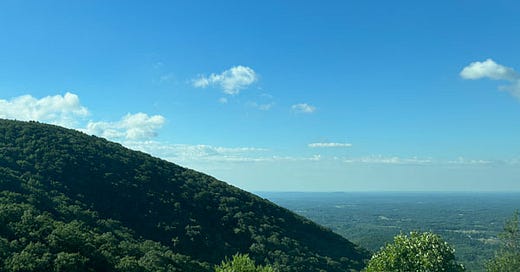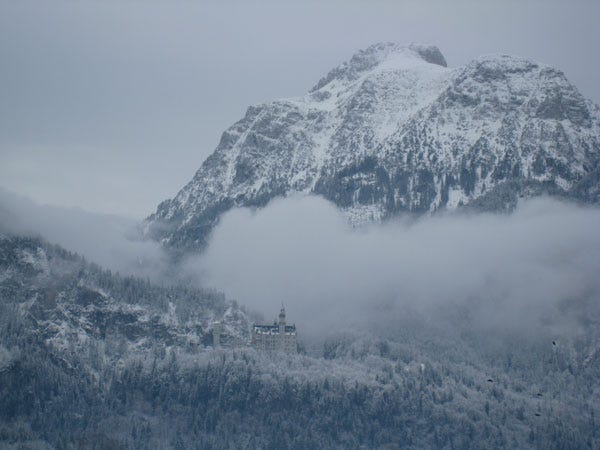America the Beautiful?
The road trip that made me rethink what my relationship to America really means
Welcome to another edition of Willoughby Hills!
This newsletter explores topics like history, culture, work, urbanism, transportation, travel, agriculture, self-sufficiency, and more.
I am back home now after spending a lot of time on the road during the last few weeks. Between my unexpected laptop problems (which are still unresolved, although I am begrudgingly leaning towards buying a new one) and wanting to spend quality time with my family, I didn’t publish issues for a bit.
When last we spoke, I mentioned that we were camping at Fort Wilderness at Walt Disney World in Florida. We decided to cut that trip a little short, and rather than just hightail it home via I-95, we took a few extra days to meander home.
We left Orlando and came across the Florida Panhandle to arrive in Dothan, Alabama. Since we purchased our RV three years ago, we have been attempting to camp in as many states as possible, and being this close to Alabama felt like it was worth taking the extra time to make the stop.
Dothan bills itself as the "Peanut Capital of the World” and hosts the National Peanut Festival. We stopped by the fairgrounds and took a picture with the giant peanut before heading out of town on US 431. Nearly every farm seemed to be growing peanuts, which I had never seen growing in the ground before. They look almost like little basil plants or pepper plants. They are short and compact. The soil between the plants was clearly visible from the road.
From Alabama, we cut across Georgia to meet some friends and their kids for ice cream in Greenville, SC. We then crossed the border into North Carolina, where we spent the night in a Cracker Barrel parking lot off the interstate, before reaching the Blue Ridge Mountains and taking I-81 through the mountainous parts of Virginia.
It’s been a while since I’ve been on the road like this, really getting to see this country at the ground level. So many of our recent trips have either been short trips to nearby places or have involved schlepping down I-95 across the George Washington Bridge, traveling the New Jersey Turnpike, or crawling on the stretch of I-95 in Northern Virginia south of DC where I’ve never been able to drive without getting stuck in long delays.
Getting away from the main arteries for a bit and traveling along some quieter stretches of road through more “natural” settings stirred up something inside of me. Perhaps it was the July 4 holiday, but for a brief moment, I was thinking of just how beautiful this country is and was feeling more proud to be an American than usual.
It was a feeling that I felt regularly a few years ago, but it’s something I haven’t really felt in a while. As I’ve been doing the work of deconstructing my education, learning the history that wasn’t taught in school books, and seen the destruction of the U.S. military around the world, the pride that I once felt for America had faded.
As we drove, I had to sit with the dissonance between these opposing views. Was America the beautiful homeland that I had always loved; the place of spacious skies, amber waves of grain, purple mountains majesty, and fruited plain? Or was it the violent place built upon the displacement of Indigenous peoples and the enslavement of African people; the place which still enslaves through the prison industrial complex and bombs indiscriminately around the world? I could see both with my own eyes. Which was true?
As I observed the beauty around me, though, I realized something. The appreciation for this beauty as something uniquely American was part of my conditioning and education as a citizen. We were taught that our land was special, our land was unique.
Was I really reacting to something uniquely “American” when I felt awe seeing a river cut through the mountains or was it something else?
I had been on roads like this and had seen views like this before, but they weren’t here.
I remember my first time flying to Europe and coming in to land at Charles de Gaulle Airport over beautiful French farm fields. I remember driving through the mountains of Germany or the farming towns of Tuscany. The serenity I was feeling in the Virginia mountains reminded me of the more rural villages in the New Territories of Hong Kong, far from the neon lights of the city center.
Perhaps the “America” that I had been taught to love was really, well, nature.
We are told that America is special because of its bounty and variety. We have mountains, beaches, deserts, and farmland. Except, so do lots of other places.
Ken Burns tells us that our National Parks were our best idea, implying that there isn’t beauty elsewhere or that other countries don’t preserve their natural wonders.
I’m not denying that there are beautiful places to visit in America- I just spent the last few weeks traveling around this country. I’m only saying that much of what we love, much of what we appreciate shouldn’t be considered uniquely “American.” It’s nature.
The last few days of our trip were spent in Lancaster, PA, a place I’ve started to visit more frequently and have written about before. Being around the Amish community there reminds me of how simple life can be and how it can be lived in harmony with the natural world.
Our campground was adjacent to an Amish farm, and our campsite was literally against the farm’s fence. All day long, I watched as cows and horses roamed the barnyard, just feet from our RV window. The animals ate grass, then dropped their manure, which made more grass. The grass looked healthy, the animals looked healthy, the Amish farmers and their young children looked healthy.
The more I thought about it, nature is really what’s beautiful. America tries to claim it, but it doesn’t belong to any of us. We are a part of it and it is a part of us. What happens to the land in one part of the world affects the land in another part. So too what happens to people in one part of the world affects all of us.
I didn’t feel especially patriotic anymore by the end of our trip, but rather just felt deeply human and part of something bigger: humanity.
Thanks for reading Willoughby Hills! Subscribe for free to receive new posts and support my work.
Related Reading
Did I Have West Virginia Wrong?
If you’ve missed past issues of this newsletter, they are available to read here.










Nice reflections. I´ve been doing the same. I also turned 62 a few months back so I purchased my lifetime National Parks Pass and I did this at the same time: https://lakotalaw.org/parks?fbclid=IwZXh0bgNhZW0CMTEAAR2Nad9ZXnZDRLemSieHZUrVCsbMBYMnmxp-8JklP6L-642KMsCkzyrXfSM_aem_iGk_rvAnIX2B08czmzqWPg